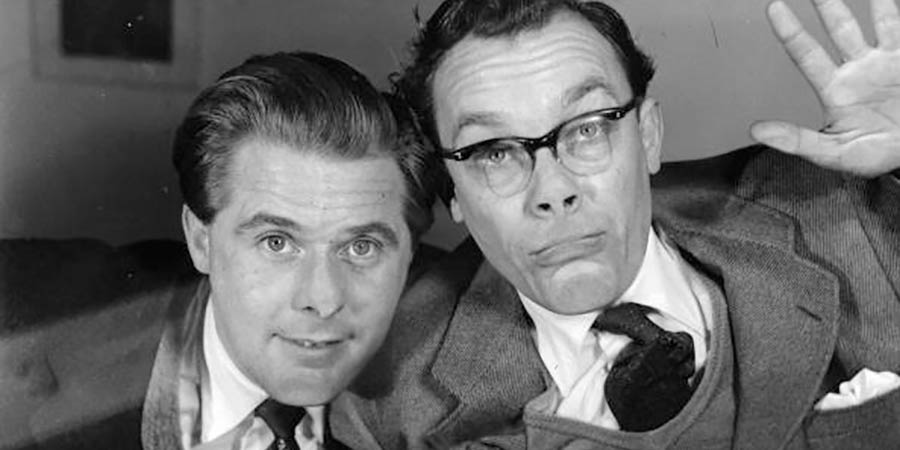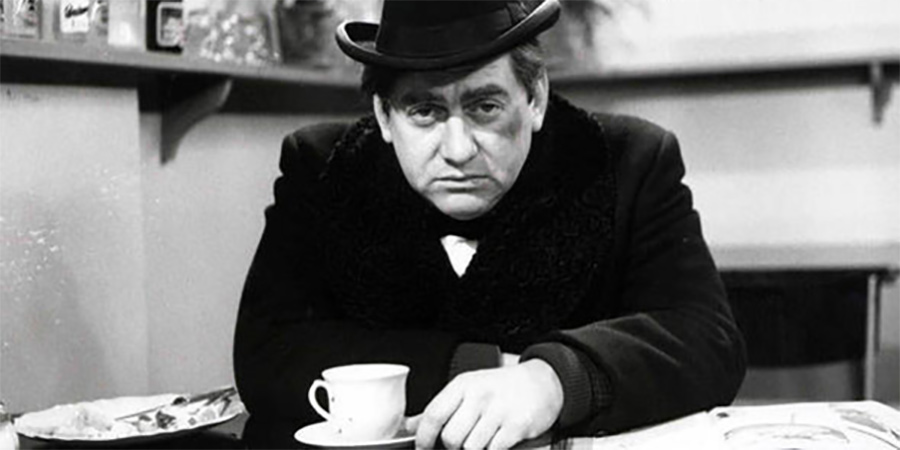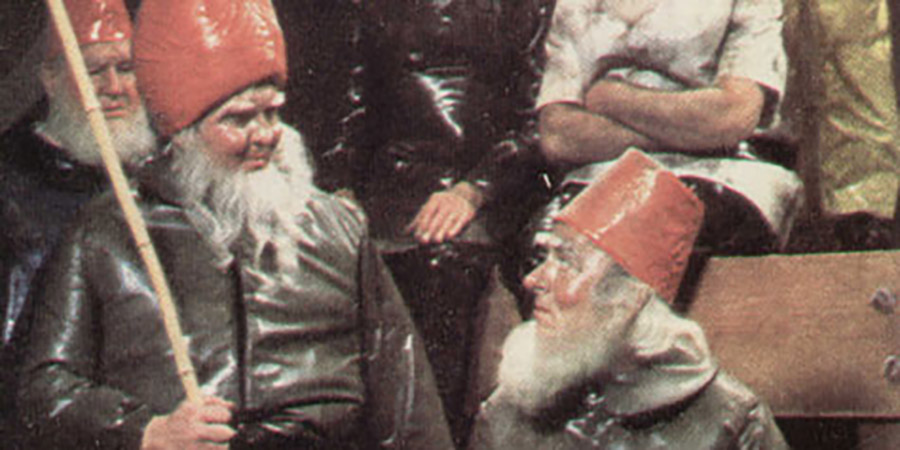Three shows missing from the archives
Although it seems hard to believe now, the BBC didn't actually have an official video archive until around 1980. Tape was expensive; it was common practice to literally record over old programmes in order to make way for new ones, and as such what has survived from the beginnings of the BBC up until the late 70s has been based on almost pure luck.
While many episodes have since been recovered (often from copies that were distributed overseas) thousands of others are seemingly missing forever - commonly labelled 'missing believed wiped'. Join us, as we look at the fascinating stories behind just three such comedies now sadly missing from the archives.
Morecambe & Wise - Running Wild

By the mid-fifties Morecambe & Wise were a double act who had gained nationwide fame for both their stage and radio work. Their next step seemed obvious, yet for some reason this warning was repeatedly given to the pair: 'You keep off TV - it'll do you no good'.
The duo's first foray into the world of BBC television was in 1954 with Running Wild, the entirety of which remains lost to time. However, the boys - Eric in particular - may well have considered this fact a blessing. Five days after the first broadcast of the scattergun sketch/variety format, a short review appeared in The People (Sunday 25th April 1954) from critic Kenneth Baily. It read simply:
Definition of the Week: TV set: the box in which they buried Morecambe and Wise.
It may have been the final nail in the coffin as far as Running Wild's future was concerned. The situation was serious enough that the duo's then-agent, Frank Pope, wrote to the BBC demanding that they pull the remaining episodes, but they refused and the programme ran to its conclusion.
Morecambe & Wise must have thought it was all over. Such was the impact of this devastating put-down that Eric carried the review in his wallet for the rest of his life: when Eric & Ernie became the biggest thing on the box it both amused and grounded him. Perhaps he kept it initially to spur him on to triumph, and triumph they certainly did. But still, something about Running Wild had disillusioned the duo, so much so that they didn't return to television for another seven years. Sadly, with no footage or audio fragments surviving, we don't exactly know why.
The excellent biopic Eric & Ernie (starring Daniel Rigby and Bryan Dick) delved into the story behind the scenes of the series a little more, treating us to a few glimpses of the sketches re-enacted using the surviving scripts, making it plain just how difficult a time this was for the double act. They had no control over the writing and no input during rehearsals.
Still, it's impossible for us to judge just how disappointing the series really was. The answer probably isn't as bad as has been envisaged. Television was in its infancy in those days and was held to a very high standard. Indeed many shows from the era that were subject to a contemporary roasting but have survived (such as Tony Hancock's first sketch show, broadcast live on the newly launched ATV) turn out to be much better than those vocal detractors would have us believe. Either way, Eric & Ernie can certainly rest easy.
Tony Hancock does H.G. Wells

The wiping phenomenon wasn't confined to television, unfortunately. Whilst cost of storage was less of an issue, radio also suffered as both mediums were considered ephemeral entertainment with no future value. One such audio victim aired on New Year's Eve 1956: The Man Who Could Work Miracles. It saw the grandfather of modern British comedy take on the grandfather of modern science fiction in one of radio's greatest and most unusual missing treasures. Esteemed comedy producer Dennis Main Wilson penned an adaptation of the short and rather obscure H.G. Wells story (published in 1898), which has been lauded as one of the first examples of "contemporary fantasy" in literature.
A film adaptation had been made in 1936 starring Roland Young, but otherwise the narrative remains one of H.G. Wells's lesser-known works. It is the story of a man who disputes the existence of miracle workers, only to find out that he is one himself.
Starring Hancock with Kenneth Williams and Hattie Jacques (who had only just joined Hancock's Half Hour as a regular), and featuring Warren Mitchell, Charles Lloyd Pack, Hugh Morton and Fred Yule, this adaptation used Hancock's Half Hour music cues, becoming almost a fantasy edition of the classic radio sitcom.
A script does exist, although it is not in the public domain. Still, we can work out who Kenneth Williams might have played: the irksome Mr Winch, a policeman who annoys Hancock's character so much that he appears to inadvertently send him to Hades. Winch becomes almost indistinguishable from Ken's famous character of Snide ('No, stop messing about'). In the original text taken from H.G. Wells's short story, Hancock's Fotheringay explains, "I was working a miracle," to which Winch replies, "Working a-! 'Ere, don't you talk rot. Working a miracle, indeed!"
There is little evidence of how well it was received, but we do know Hancock struggled at the recording - as he so often did without the support of either Sid James or June Whitfield.
Some insight is contained in Kenneth Williams's diary. He wrote of Hancock at the recording:
He failed to come up at the end, and I know it was because he didn't believe in what he was saying. If he is philosophically opposed to a script idea, he doesn't seem able to perform it.
Ken seemed to be insinuating that Hancock wasn't completely sold on science-fiction fantasy as a genre, even though the piece was something of a comedy and Hancock's Half Hour had ventured into the genre on more than one occasion.
There is, however, one very interesting footnote that seems to suggest that Hancock perhaps did take an interest in sci-fi after all. It was said that when Terry Nation worked with Hancock on his now sadly infamous 1963 ATV sitcom, Tony suggested that Nation's robotic alien creatures for a new BBC children's series should be shaped like 'an inverted cone' and be 'covered in ping pong balls with a sink plunger coming out of its head'. When Doctor Who debuted the world-famous monsters, Hancock was said to declare, 'That bloody Nation. He stole my Daleks!'
Is there any truth to this? It has been disputed, and the history of the Daleks is long, complicated, and another story entirely (involving a fantastically cunning bit of contract work by Beryl Vertue). However, Channel 5 delved deep into the mystery for Doctor Who's 60th anniversary, revealing that after Terry Nation passed away, Roger Hancock (Tony Hancock's brother), who had been Nation's agent for some years, gained control of his estate and drove a hard bargain for use of the Daleks when Doctor Who was revived in 2005.
There is, therefore, no denying that the Daleks do remain inextricably linked with the Hancocks. Stone me!
Hugh Lloyd and Terry Scott in The Gnomes Of Dulwich

Jimmy Perry wasn't just one of British comedy's greatest and most prolific writers: he also loved gnomes. So much so that, through his wife's encouragement, he spun one sketch he had penned for Morecambe & Wise into an entire sitcom about them.
The 1969 children's series (produced by the great Sydney Lotterby) starred Hugh Lloyd and Terry Scott, who had enjoyed success in an on-screen comic partnership throughout the sixties in sitcom hit Hugh And I. This was to be the last time they starred opposite each other on television, and to say it was a strange send-off for the duo would be an understatement: here they were two sentient gnomes dressed in bright, shiny, red hats.
Jimmy Perry tried to explain the series in 2009, saying: "Terry Scott and Hugh Lloyd were two gnomes who would sit by a pond and comment on life, race, religion - everything. It became a little cult."
John Clive, Leon Thau, Anne de Vigier and Lynn Dalby completed the cast, all of whom played similarly brightly painted garden gnomes and various other garden nick-nacks. There were a few guest stars who played human parts, such as Dad's Army's own Frank Williams, who recalled:
I was in an episode in which the gnomes had been purchased at a Labour Party bazaar by Mary Wilson, wife of the Prime Minister. They stood at ground level contemplating the legs of the various guests at a garden party. Clad in Carnaby Street trousers (it was quite difficult to find anything that fitted me in that haunt of trendy young people). I wandered around as a society photographer. As the audience only heard my voice and saw my disembodied legs they were never quite sure who I was, but I decided that this was my one chance to play royalty and that I was Lord Snowdon.
Perhaps it was an early precursor to Toy Story, or a sort of live-action Bill & Ben, the Flower Pot Men. Whatever the case, The Gnomes Of Dulwich (the title a pun on 'Gnomes of Zurich', a derogatory term for Swiss bankers) was once voted the 35th most-wanted missing TV programme in Britain, owing to the pedigree of the cast and celebrated writing talent of Perry.
Alas, all six episodes have been lost. We do have a few fragments of surviving audio, but that doesn't give us the full majesty of Hugh Lloyd and Terry Scott sitting around in plastic gnome outfits dangling their fishing rods into a little pond, which is what we all really want to see if we're honest.
Help British comedy by becoming a BCG Supporter. Donate and join us in preserving, amplifying and investing in comedy of all forms, from the grass roots up. Advertising doesn't cover our costs, so every single donation matters and is put to good use. Thank you.
Love comedy? Find out more
